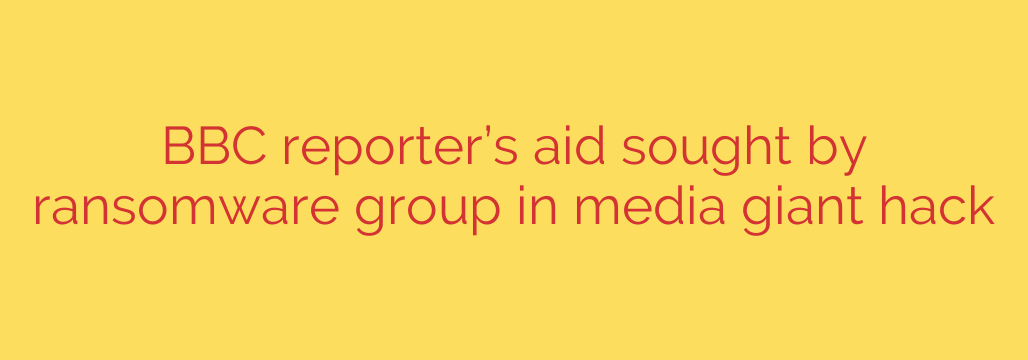
Ransomware Gangs Adopt Bold New Tactic in Major Media Giant Hack
The world of cybersecurity is constantly evolving, and cybercriminals are developing increasingly aggressive tactics to force victims into paying ransoms. In a disturbing new development, a ransomware group has directly contacted a journalist to publicize a recent data breach at a global media and entertainment company, amplifying pressure on the firm by turning a private extortion attempt into a public crisis.
This brazen move signals a strategic shift in how cyber attacks are conducted, moving beyond mere technical infiltration to include sophisticated public relations manipulation.
A Direct Line to the Media: The New Frontier of Extortion
The ransomware group, known as Rhysida, has claimed responsibility for a significant cyber attack on a major media conglomerate. Instead of communicating exclusively with their victim, the hackers reached out to a reporter via encrypted email, providing proof of the hack and offering the stolen data for sale.
The terms of their demand are chillingly clear: the group is auctioning off the entire cache of stolen data for 50 Bitcoin, which currently equates to over $2.6 million. They have imposed a strict seven-day deadline for the sale. If a buyer isn’t found, Rhysida has threatened to release all the compromised information to the public, ensuring maximum damage.
This tactic of involving the press is a calculated form of psychological warfare. By publicizing the breach, the hackers aim to:
- Increase Reputational Damage: News of a major hack can erode customer trust and damage a company’s brand.
- Intensify Pressure: Public scrutiny and media attention place immense pressure on the victim’s leadership to resolve the situation quickly.
- Create Internal Panic: Employees whose data has been stolen will naturally become anxious, adding another layer of internal crisis for the company to manage.
What Was Stolen? The High Stakes of the Breach
To prove the legitimacy of their claims, the hackers shared samples of the stolen files with the journalist. The compromised data is highly sensitive and could have devastating consequences for the company’s employees.
The stolen information reportedly includes:
- Scanned copies of employee passports and driver’s licenses
- Confidential HR documents, including sensitive legal paperwork
- Internal financial information and production details
The leak of such personal and confidential information poses a severe risk of identity theft and fraud for thousands of employees. For the company, it represents a catastrophic failure of data protection and a potential legal and regulatory nightmare. When asked about their motives, the Rhysida group was blunt, stating their primary goal is financial gain.
How Businesses Can Prepare for Modern Cyber Threats
This incident serves as a stark reminder that a cybersecurity plan cannot exist in an IT silo. Attackers are now targeting a company’s reputation as much as its data. Here are crucial steps every organization must take to defend against these multi-faceted attacks.
Integrate PR into Your Incident Response Plan: Your crisis communication strategy is as important as your technical response. You must have a pre-approved plan for communicating with the media, customers, and employees in the event of a breach. Delays or confusion can make the situation significantly worse.
Bolster Foundational Security: Prevention is always the best defense. Implement multi-factor authentication (MFA) across all systems, conduct regular security awareness training for employees, and maintain a rigorous schedule for patching software vulnerabilities.
Secure and Minimize Data: Follow the principle of data minimization. If you don’t need sensitive data, don’t store it. For essential data, ensure it is encrypted both at rest (on servers) and in transit (over the network). This makes the data useless to hackers even if they manage to steal it.
Practice Your Response: Don’t let a real crisis be your first drill. Run tabletop exercises that simulate a comprehensive attack, including a public data leak scenario. This helps your technical, legal, and communications teams work together effectively under pressure.
The game has changed. Cybercriminals are no longer hiding in the shadows; they are actively seeking the spotlight to leverage public opinion as a weapon. Businesses must adapt their defenses to fight a war on two fronts: one for their data and another for their reputation.
Source: https://www.bleepingcomputer.com/news/security/ransomware-gang-sought-bbc-reporters-help-in-hacking-media-giant/








